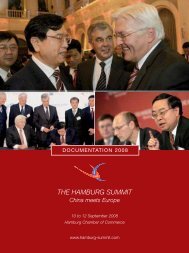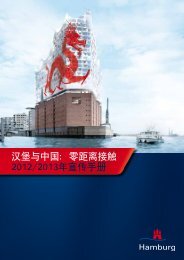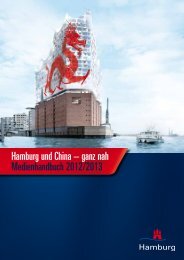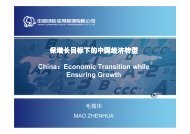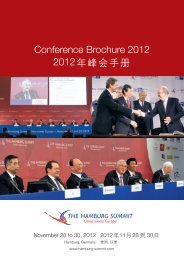Keynote speech by Annette Schavan, Federal ... - Hamburg Summit
Keynote speech by Annette Schavan, Federal ... - Hamburg Summit
Keynote speech by Annette Schavan, Federal ... - Hamburg Summit
You also want an ePaper? Increase the reach of your titles
YUMPU automatically turns print PDFs into web optimized ePapers that Google loves.
“The <strong>Hamburg</strong> <strong>Summit</strong>: China meets Europe”<br />
<strong>Keynote</strong> Speech<br />
<strong>by</strong><br />
<strong>Annette</strong> <strong>Schavan</strong><br />
<strong>Federal</strong> Minister of Education and Research of the <strong>Federal</strong><br />
Republic of Germany<br />
- Check Against delivery -<br />
<strong>Hamburg</strong> Chamber of Commerce<br />
November 28, 2012<br />
1
The cooperation between Minister WAN Gang and me is characterized <strong>by</strong> trust and a<br />
sense of responsibility. We have known each other for many years. It is therefore a<br />
great honour for me to open the 5th <strong>Hamburg</strong> <strong>Summit</strong> "China meets Europe" with<br />
him today.<br />
China and Germany have steadily developed their cooperation to become a strategic<br />
partnership over the last four decades since they first assumed diplomatic relations.<br />
The first German-Chinese consultations in 2011 marked the beginning of a new era<br />
in their partnership. Germany only maintains this kind of partnership with seven<br />
countries in the world. And as far as the People's Republic of China is concerned,<br />
Germany is the first country with which it has conducted government consultations.<br />
Regular visits <strong>by</strong> the specialist ministers and the <strong>Federal</strong> Chancellor and the Chinese<br />
Prime Minister serve to intensify our exchanges on strategic topics. China was this<br />
year's partner at the Hanover Fair. Relations between our two countries have never<br />
been as good as they are today.<br />
The <strong>Hamburg</strong> <strong>Summit</strong> has definitely contributed to this success since 2004. It has<br />
become a central platform for German-Chinese and European-Chinese cooperation.<br />
My sincere thanks go to the initiators of the <strong>Summit</strong>. Trust grows with the continuity of<br />
the dialogue. The topics of this year's <strong>Hamburg</strong> <strong>Summit</strong> are analogous to the topics<br />
of the dialogue between the governments of our two countries: They range from<br />
questions of market access, innovation and investments to the joint development of<br />
solutions to forward-looking issues such as urbanization.<br />
Economic relations between Germany and China form a stable and at the same time<br />
dynamic foundation for our relations. Bilateral trade between our two countries<br />
reached an all-time record in 2011 at 144 billion euros. Measures to strengthen<br />
innovation have priority in both our countries. This is why our relations in science and<br />
research are of special importance. For many years now, my colleague WAN Gang<br />
has shown himself to be a successful bridge-builder between China and Germany –<br />
and Europe as a whole. His outstanding knowledge of our country has produced<br />
tremendous results.<br />
We share the firm conviction that research and innovation are the drivers of<br />
economic and social development. Germany is Europe's technology powerhouse and<br />
is among Europe's leaders regarding expenditure on research and development. The<br />
Chinese government is pursuing a very successful and ambitious innovation strategy.<br />
Germany and China are roughly equal as far as worldwide patent applications are<br />
concerned.<br />
The effective protection of intellectual property is an important factor for cooperation<br />
in innovative fields. And it is a good sign that we are seeing increased understanding<br />
for our position. This too demonstrates the quality of German-Chinese relations.<br />
The German-Chinese Innovation Platform, which held its second conference in Berlin<br />
this week, is another indication of the ambitions of both countries in the field of<br />
innovation. Further examples are cooperation projects in the life sciences, in<br />
sustainable water management, in electromobility and in the field of LED<br />
technologies. We are also expanding our cooperation in education <strong>by</strong> introducing the<br />
German-Chinese alliance in vocational education and training and the strategic<br />
partnership in higher education. Young people in China and Europe need powerful<br />
signals emphasizing the importance of good education and strong research as the<br />
source of future prosperity. This is a guideline for our cooperation: Europe and China<br />
2
oth have ageing societies – compared with the world average – and it is important to<br />
take effective steps to secure the future opportunities of the young generation.<br />
Cooperation in research also involves finding answers to the great questions of our<br />
times: How do we ensure the availability and fair distribution of water and other<br />
resources that are in short supply How do we remedy climate change How do we<br />
meet the challenges of ageing societies How do we secure supplies of renewable<br />
energy and how do we create energy-efficient cities How do we provide the world's<br />
population with sufficient food These questions cannot be solved at a national level.<br />
It is a matter of finding joint answers and developing joint strategies for action.<br />
We are convinced: The innovations of today are the source of our future prosperity.<br />
They are innovations which take into account the basis of life of future generations.<br />
Sustainability and innovation are two sides of the same coin.<br />
Europe and China are two cultures that are linked through their rich traditions. The<br />
contacts between our cultures reach far back into history. The trading routes of the<br />
Silk Road linked China and Europe long ago and European scholars in early modern<br />
times were enraptured <strong>by</strong> all things Chinese.<br />
We have learned a lot from one another over the last forty years. Friendship stems<br />
from knowledge of the culture and intellectual tradition of the partner country. This is<br />
why a stronger exchange of students and researchers is so important. And this is<br />
why we are strengthening partnerships between universities.<br />
The German initiative "Germany and China – Moving Ahead Together", which ran<br />
from 2007 to 2010, promoted intercultural understanding as the basis for cooperation.<br />
It presented people in different areas of China and finally at EXPO 2010 in Shanghai<br />
with an impression of modern-day Germany. The campaign was a great success.<br />
This is why I consider the Year of Chinese Culture, in which China is presenting itself<br />
in Germany, to be so important.<br />
There is still room for expansion as far as Chinese investments in Germany are<br />
concerned. We are seeing increasing interest in Germany as a place for industrial<br />
investments in the heart of Europe and we very much welcome investors from China,<br />
who want to commit themselves in the long term and create jobs in Germany.<br />
Permit me to say a few words about the current situation in Europe:<br />
The financial situation and competitiveness of some countries in the Eurozone are<br />
abiding themes both in Europe and on the international stage. Heavily indebted<br />
public budgets, particularly in the Eurozone, are causing anxiety.<br />
Germany supports a resolute path towards reducing debts as well as measures to<br />
make the economic and monetary union crisis-proof. I am convinced that: We need<br />
more resolute national efforts and the right degree of Europe-wide solidarity. We in<br />
the <strong>Federal</strong> Government will do everything to stabilize and strengthen the Eurozone<br />
and the euro. A globally networked, export-oriented economy like Germany has no<br />
alternative to the euro. We have a historic responsibility to enhance the integration of<br />
the European Union, which has given Europe and the whole world such a long,<br />
stable phase of peace and social and economic prosperity. When, in a few days' time,<br />
the European Union receives this year's Nobel Peace Prize we will be reminded of<br />
the great services of those people who founded the European Union and have<br />
3
steadfastly developed it over the years. This award is also an incentive for us to act in<br />
such a way that Europe can emerge from the crisis stronger than before. This<br />
requires efforts to enhance industrial competitiveness and innovative strength in<br />
Europe as well as resolute steps to reduce the debts. China and Germany – as the<br />
world's two largest export nations – are particularly interested in open markets. Our<br />
joint aim must be to balance the great disequilibrium worldwide. No measures should<br />
be taken that contradict this principle. These include export restrictions based on<br />
quotas and differences in treatment when granting licences. Friendship and a good<br />
partnership allow us to discuss critical points amicably. And so we have learned a lot<br />
from one another over the last forty years. I hope that this will continue to be the case<br />
in future.<br />
The upcoming issues that we will discuss concern the basis of life for future<br />
generations. We bear a particular responsibility in this context. This is why openness<br />
is so important in a fair and equal partnership.<br />
Both sides feel this particular responsibility and I am confident that the successful<br />
strategic partnership between China and Germany will provide a sound foundation for<br />
future joint activities aimed at sustainable development.<br />
4



